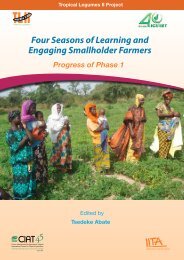ICRISAT - ICRISAT: Medium Term Plan 2010-12 - 2010-12
ICRISAT - ICRISAT: Medium Term Plan 2010-12 - 2010-12
ICRISAT - ICRISAT: Medium Term Plan 2010-12 - 2010-12
You also want an ePaper? Increase the reach of your titles
YUMPU automatically turns print PDFs into web optimized ePapers that Google loves.
Semi-Arid Tropics by markedly increasing the availability of time-series district-, household-,<br />
individual-, and field-level data. It seeks to improve the quantity and quality of time-series<br />
meso- and micro-data so that decision-making is based on evidence on impacts on the poor.<br />
In Asia, the project is driven by three initiatives: the compilation of longitudinal household,<br />
individual, and field data over five years in 42 villages in India and Bangladesh, the assembly<br />
of secondary meso-level agricultural data into integrated data bases for distribution, and the<br />
nurturing of policy and data analysis, and capacity building. In West Africa, the project is<br />
driven by 2 initiatives: the compilation of longitudinal household, individual and field data over<br />
3 years in 20 villages in Niegr and Burkina Faso and the data analysis and capacity building.<br />
This multi-disciplinary study builds on the unique databases already developed and will add<br />
considerable value to them. It will provide a distinctive social science laboratory to address<br />
contemporary issues related to institutional, policy and technological changes and their actual<br />
past and potential scope to benefit the poor. It will also allow for innovative quantitative and<br />
qualitative analysis of rural poverty that offers new insights into producing a forward looking<br />
and policy oriented knowledge base and decision support system.<br />
The project/study has the ability to magnetize the best and brightest in the social sciences<br />
globally to conduct research on the most impoverished regions of the developing world and<br />
establish a longitudinal panel data for the two countries in Asia (India and Bangladesh) and 2<br />
countries in West Africa (Niger and Burkina Faso), will further serve as an exemplar for other<br />
national programs in developing countries. Having the opportunity that the VLS approach<br />
affords to periodically revisit the same households and villages over cropping seasons and<br />
years is an exciting prospect for practitioners and researchers alike. The potential for dynamic<br />
ground truthing is a fertile environment for the generation of ideas.<br />
International Public Goods<br />
Methodologies, tools and other IPGs that have applicability beyond one nations borders.<br />
The projects outputs are often globally derived, building on <strong>ICRISAT</strong>’s strengths throughout<br />
the SAT and it delivers clear examples of international public goods (IPGs).<br />
These are:<br />
• Village Level Studies (VLS): overall methodology, risk preferences, estimation of time<br />
preference, research and policy findings. The VLS database which has been historically<br />
a vital IPG used by international partners from the broadest spectrum<br />
• Research evaluation and impact assessment (REIA): methodology, training modules<br />
• Future outlooks and development opportunities in SAT agriculture identified through<br />
strategic assessments<br />
• Institutional innovations for reducing risks and transaction costs in input and output<br />
markets<br />
• Ways to linking market and livelihood analysis with priority setting and technology<br />
design<br />
• Decision tools and models for evaluation of options for sustainable intensification and<br />
diversification of SAT agriculture<br />
• Producers and consumers’ preferences for dryland legumes and cereals in intermediate<br />
and end user markets and implications for technology design<br />
• Seed policy options to facilitate policy harmonization, market development and trade to<br />
ensure sustained access to quality seed of improved varieties by farmers<br />
Elaboration of Partners Roles<br />
The national program partners participate in project planning and implementation as well as in<br />
training and capacity building. The evolving network of social scientists adapts methods<br />
developed by <strong>ICRISAT</strong> while policy makers use alternative development pathways particularly<br />
for pro-poor policies and risk management strategies. Higher degree students will be<br />
<strong>ICRISAT</strong> MTP <strong>2010</strong>-<strong>12</strong> 23

















